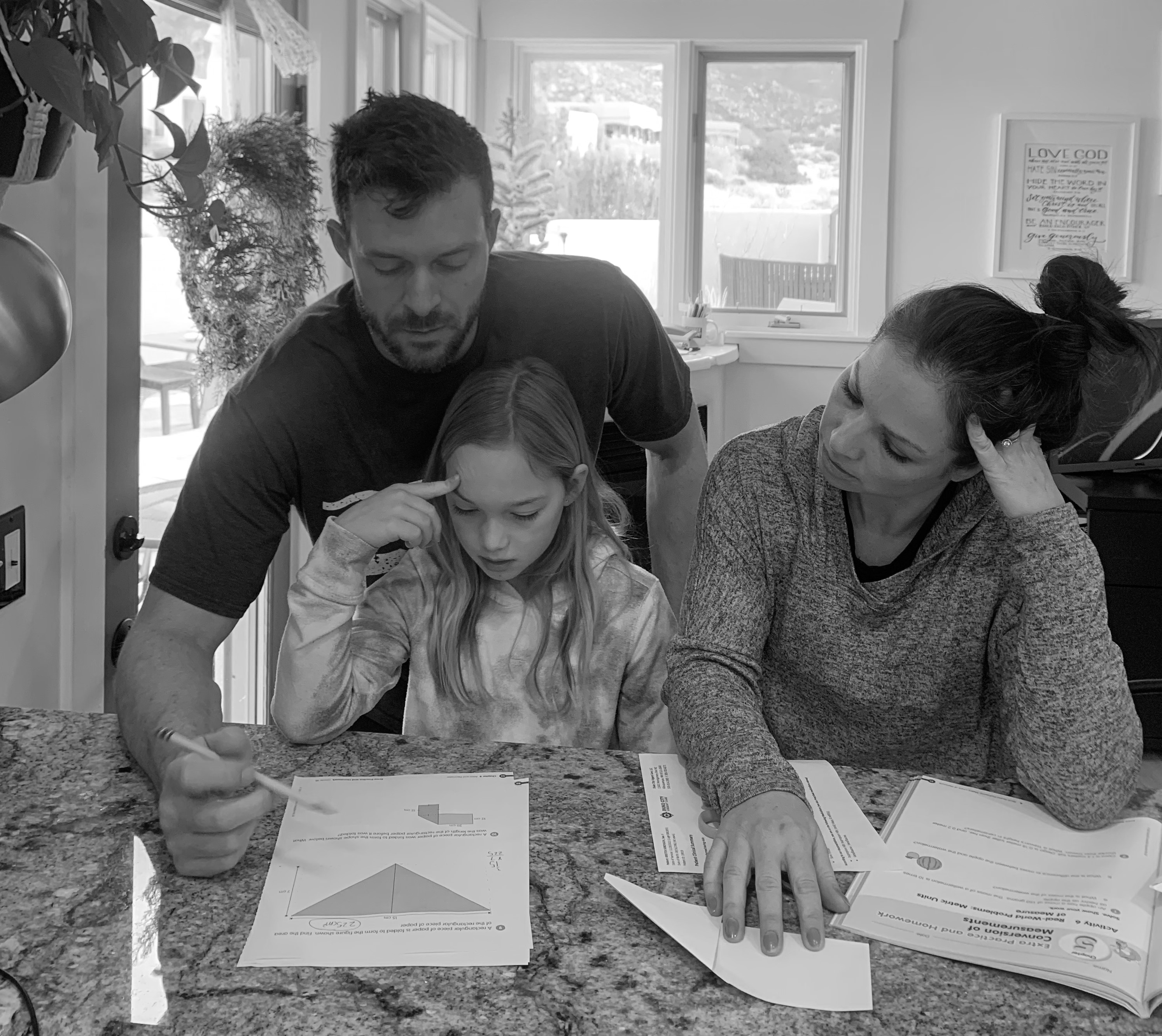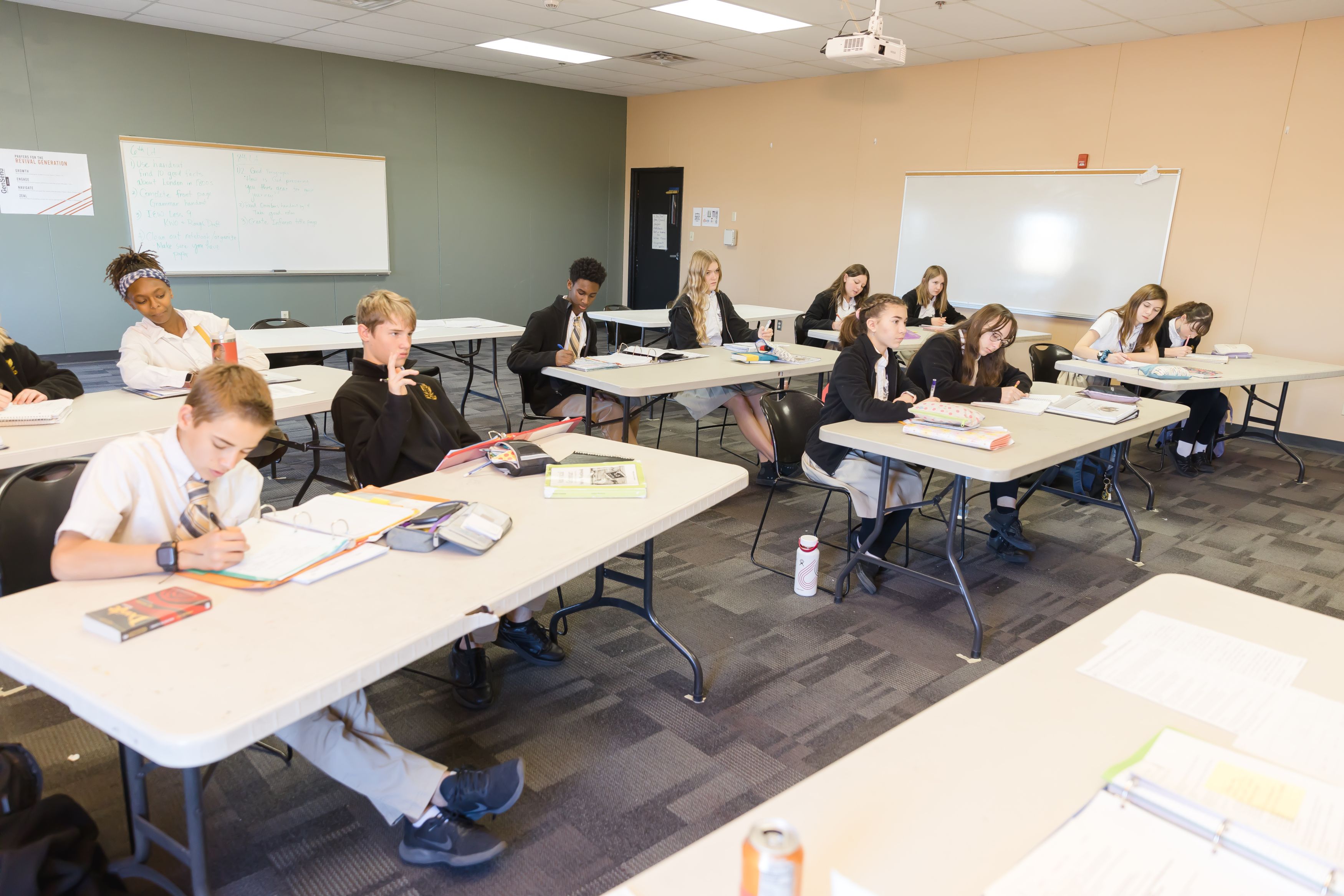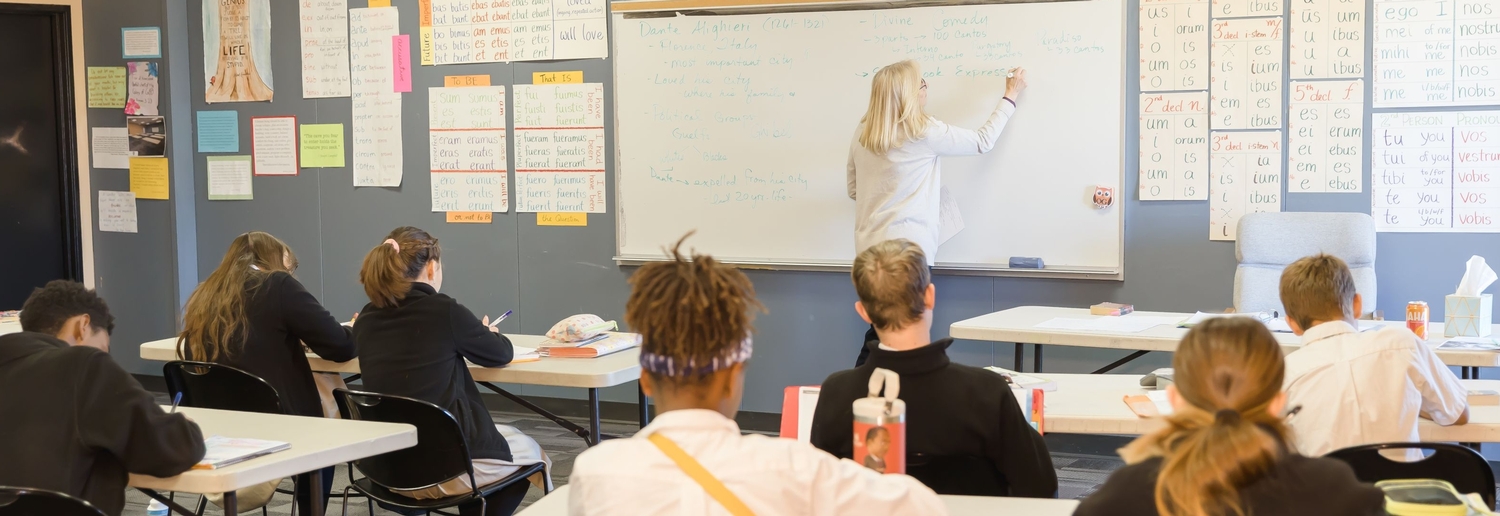
With solid foundations, our Logic School students have a natural tendency to ask “why?” or “what if?” Questioning, searching, vetting, and arguing are pivotal and important in our Logic School curriculum choices.
Our focus in logic school is helping students learn to critically analyze more complex issues by applying the difficult “why” and “how” questions to each subject area. Through the study of formal logic, they develop reasoning skills, recognize and avoid invalid conclusions, and construct persuasive arguments. Our literature discussions lead students through questions such as “What should or shouldn’t have X done in this situation? Why or why not?” as well as asking them to put themselves into the shoes of an unexpected role in history, science, or theology. Going deeper into mathematics, English grammar, Latin studies, history, and science, Logic students entertain thoughts of a wide variety and, by grace, learn to love their neighbors more deeply as a result.
Parent's Role
 Guide for Dependent Study
Guide for Dependent Study
In Logic School, the role of parent transitions to a Guide for Dependent Study and becomes more hands-off than the co-teacher role in Grammar School. The student in logic school is at a dependent age where disciplined study habits must be developed - not by parental force - but through positive encouragement and through the student's growing awareness of personal consequences. Parents will still read each lesson plan, assist student with time management, offer assistance as needed, and check assignments for understanding of concepts and completeness. In order for the class to be successful, the classroom teacher is dependent upon the parent to make certain that the student keeps up with the course assignments and communicates with the teacher if difficulties arise.
5th - 6th Grade
• Complete 50-70% of school work independently
• Continue to develop computer keyboarding skills
• Begin note-taking skills
• Comfortable with test-taking
• Independently remember and apply classroom instruction
• Able, with little guidance, to prepare and use a daily agenda
• Able to record teacher notes and major events in planner
• Begin to set personal goals
7th-8th Grade
• Complete 70-85% of school work independently
• Proficient in computer keyboarding skills
• Able to complete all school work thoroughly and on time
• Independently prepare daily agenda in planner
• With help, develop weekly agenda
• Use planner as a prioritized task list
• Able to transfer incomplete assignments in planner
• Develop note-taking skills
• Develop test taking skills and strategies
Learn about High School record-keeping for college admissions
• Explore individual talents and interests
• Develop strong time-management skills
• Monitor progress in reaching personal goals
LANGUAGE ARTS
In Logic Language Arts, students continue to develop their understanding of writing and grammar through the utilization of various grammar resources, IEW, and Lost Tools of Writing Level I. While the development of their writing skills is similar across grade levels, going deeper as they age, the literature in Language Arts changes each year, providing students an opportunity to cultivate a love for reading while learning how to commonplace and discuss the key components of any literary work. In 5h Grade, students read Otto of the Silver Hand, The Children’s Homer, and The Children of Odin. In 6th Grade, students read Little Women, Romeo and Juliet, Oliver Twist, and The Horse and His Boy, before ending the year reading and presenting a book of choice. In 7th Grade, students read Genesis, Exodus, The Magician’s Nephew, Macbeth, The Screwtape Letters, and Confessions in its various parts sprinkled throughout the year. In 8th Grade, students read The Book of James, The Odyssey, The Last Battle, The Inferno, and The Hobbit before ending the year finding wonder and curiosity through the joy of short stories.
MATHEMATICS
In Logic Mathematics, students begin the transition from arithmetic to algebra while focusing on developing a foundation for why variables are a crucial component of mathematics. In 5th Grade, students finalize their understanding of arithmetic through the study of fractions and decimals. In 6th Grade, students begin the year reviewing Grammar concepts including addition, subtraction, multiplication, division, and fractions before experiencing a taste of negative numbers, solving simple linear equations, and graphing. In 7th Grade, students dive deeper into solving expressions, including negative numbers, by developing rules and chants which further assist them in applying their foundational understanding to simplifying expressions with multiple variables by the end of the year. In 8th Grade, students apply their rules and chants to solving linear equations, graphing, complex fractions, speed and rate, and further develop their foundation to move forward in Rhetoric Geometry.
SCIENCE
In Logic Science, students begin with the study of Astronomy - looking to the stars and studying the planets. Then, in 6th grade, they begin Anatomy and Physiology, where they study the body and its skeletal structure, muscular system, digestion, cardiovascular system, and more through discussion and labs. In 7th Grade, students study General Science focusing on the history of science in relation to the creation of the world and different scientific studies, including simple machines, archeology, geology, paleontology, and biology. In 8th Grade, students study Physical Science, applying mathematical concepts to sciences through study of units of matter, the laws and equations of physics, gravity and gravitational force, and the physics of sound.
HISTORY
In Logic History, students begin foundationally studying the New Testament using flashcards, then transition locally with the study of NM History, learning about the physical features of New Mexico before discussing its settlers, exploration, becoming a territory of the United States, and officially becoming a state in 1912. In 7th Grade, students look beyond New Mexico to study US History, discussing the Early Americas and European Exploration, European colonization of America, the Revolutionary Era, the Constitution, Westward Expansion, and the Industrial Revolution. In 8th Grade, students begin to consider countries outside the US, learning about their geographical locations, discussing their cultures, and experiencing different aspects of them through videos, music, and food.
LATIN
In Logic Latin, students begin to apply the Latin grammar they have learned as they use 1st and 2nd conjugation verbs while learning to decline nouns and adjectives in the 1st -5th declensions. As students acquire more vocabulary, they are given more opportunities to translate sentences from Latin and English with understanding. In the 7th grade, students use the noun and adjective vocabulary they have acquired as they study verbs of the 3rd and 4th conjugation, the Perfect tenses and the Passive Voice. Students learn to recognize noun and verb endings in order to read and understand Latin sentences in all 6 tenses, and both Active and Passive voices. 7th graders have ample opportunities to read and translate Latin and are able to orally read a story written in Latin with accurate comprehension. In 8th grade, students use the understanding they have of declining and conjugating and are expected to apply the grammar by focusing on translation. 8th graders read interesting sentences and stories each week that they translate from Latin to English. They continue to deepen their understanding of Latin by practicing the more challenging skill of translating sentences from English to Latin, which prepares them for the Latin reading they will encounter in Rhetoric Latin.

5th Grade
Literature
Veritas New Testament History Cards
Astronomy
Math: Math in Focus 5 or Decimals & Percentages
Latin: First Form
Leadership
Fine Arts: Orchestra, Choir, Art
6th Grade
Literature
NM History
Anatomy
Math: Decimals & Percentages or Pre-Algebra
Logic Prep
Latin: Form II First Half
Leadership
Fine Arts: Orchestra, Choir, Drama, Art
7th Grade
Literature
US History
General Science
Math: Pre-Algebra or Elementary Algebra
Informal Logic
Latin: Form II Second Half
Leadership
Fine Arts: Orchestra, Choir, Drama, Art
8th Grade
Literature
World Geography
Physical Science
Math: Elementary Algebra or Algebra I
Formal Logic
Latin: Kraken Latin
Leadership
Fine Arts: Orchestra, Choir, Drama, Art
Tabitha Bryant
Head of Logic
.jpg)
